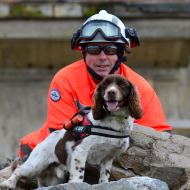Diesel and Gary search for survivors when buildings collapse.
Springer spaniel Diesel commended for efforts and home and overseas
A Scottish search and rescue dog, who was deployed to look for survivors after the 2015 Nepal earthquake, is set to receive a prestigious award from the International Fund for Animal Welfare (IFAW).
Ten-year-old Diesel, together with his handler Gary Carroll, will be presented with the IFAW Animal of the Year Award at the House of Lords on Tuesday (15 October).
James Sawyer, UK Director of IFAW, said: “Diesel is an amazing dog and a fantastic example of the positive relationships between animals and humans. This dog not only provides a vital service for members of the public in desperate need but also helps safeguard his handler and other rescuers in potentially dangerous situations.”
Working with Scottish Fire and Rescue Service (SFRS), Diesel is one of a very small team of UK dogs whose specialist skills are used by the UN International Search and Rescue Team (ISAR). In 2015, he was deployed to search for survivors of the devastating earthquake in Nepal.
Diesel’s primary responsibility to search for survivors when building collapse, such as after gas explosions. However, he is also deployed to search for vulnerable missing persons, often the elderly or young, or survivors of traffic accidents who sometimes wander off due to shock or other injuries.
Diesel and Gary often attend events to meet the public and educate people of all ages on fire safety. Furthermore, with over 5,000 followers on Twitter, Diesel has become a social media star and uses his fame to deliver important fire safety and advice to the public.
Gary Carroll said: “I feel very grateful and honoured that Diesel is receiving this IFAW award, which we will be accepting on behalf of the Scottish Fire and Rescue Service and all the International Search and Rescue dogs and their handlers who all do fantastic work. I feel this award should be for all of them. Having trained dogs like Diesel is so important in protecting the safety of people both in the UK and for work overseas.
“In major building collapses and earthquakes, we really rely on them to let us know if people are alive or not and we can trust their responses.”
Image (C ) IWAF.







 Birmingham Dogs Home has issued an urgent winter appeal as it faces more challenges over the Christmas period.
Birmingham Dogs Home has issued an urgent winter appeal as it faces more challenges over the Christmas period.
